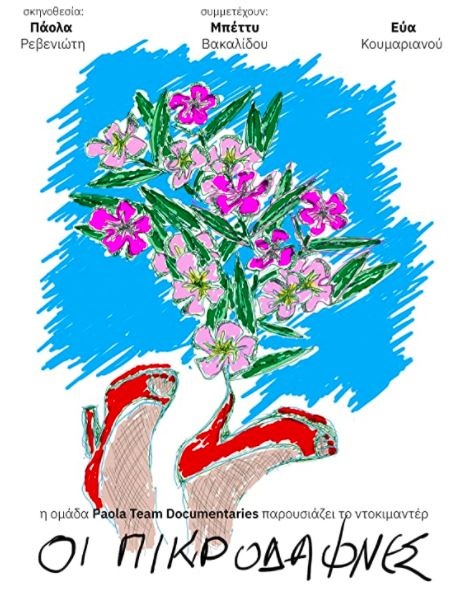A random collection of films authored by or about my transgender, intersex sisters, and gender-nonconforming persons all over the world. I watched some of them, and I was inspired by some of them. I met some of the authors and heroines, some of them are my best friends, and I had the pleasure and honor of interviewing some of them. If you know of any transgender documentary that I have not covered yet, please let me know.
Director: Paola Revenioti
Release Year: 2021
Original title: Oi pikrodafnes
Synopsis:
Paola Revenioti, Eva Koumarianou, and Betty Vakalidou, now in their 60s, have known each other for more than forty years. They started making their living early in their youth as sex workers in Athens, Greece. In the documentary, they revisit all the different places in the city where they used to work, socialize, get harassed or arrested by the police, fight for their rights, have fun and find love. Their unapologetic, humorous, and empowering discussion gives rise to the discussion about the history of transgender women in Greece.
In the vibrant tapestry of modern Greek culture, few narratives shine as brightly or as unapologetically as that of Paola Revenioti and her lifelong friends, Eva Koumarianou and Betty Vakalidou. Their journey, immortalized in the documentary Oi Pikrodafnes, transcends the mere recounting of personal history; it serves as a poignant exploration of identity, resilience, and the ever-evolving fight for rights within the backdrop of Athens, Greece. As they navigate the streets that were once their workplaces, battlegrounds, and sanctuaries, they offer viewers an unfiltered glimpse into the lives of sex workers, particularly transgender women, in a society marked by both love and stigma.
2021,
Betty Vakalidou,
Eva Koumarianou,
Greek,
Paola Revenioti,
Director: Paola Revenioti
Release Year: 2015
Synopsis:
In the rich and often tumultuous tapestry of LGBTQ+ history, few threads shine as uniquely as Kaliarda, a secret language that emerged from the depths of Greece's gay subculture. This fascinating linguistic phenomenon not only served as a means of communication but also as a form of resistance and identity for the LGBTQ+ community, particularly from the end of World War II through the regime changes of the 1970s. At the forefront of exploring this hidden gem is Paola Revenioti, a prominent Greek LGBTQ+ rights activist, artist, and transgender icon, whose dedication to documenting the history of Kaliarda has shed light on the struggles and triumphs of the community.
Kaliarda, often referred to as the “language of love,” developed as a form of coded communication among members of the LGBTQ+ community in Greece. Emerging in a time when homosexuality was criminalized and societal stigma was rampant, Kaliarda allowed individuals to express their identities and share experiences discreetly. The language drew from a variety of sources, including Greek slang, Italian, and even Turkish influences, creating a rich lexicon that served both practical and cultural purposes.
2015,
Greek,
Paola Revenioti,
Director: Dimitris Stavrakas
Release Year: 1979
Original title: Μπέττυ
Synopsis:
In the landscape of Greek cinema, few works capture the complexities of identity, struggle, and resilience as poignantly as Μπέττυ (1979), a docudrama directed by Dimitris Stavrakas. This compelling film draws from the life of Elizabeth Vakalidou, a trailblazing figure in Greece’s LGBTQ+ movement. Through its rich narrative and emotional depth, Μπέττυ not only recounts Vakalidou's personal journey but also sheds light on broader societal issues regarding gender identity and sexual orientation in a conservative cultural context.
Born in Alexandroupolis, Elizabeth Vakalidou faced significant challenges from a young age. As a teenager, she experienced rejection and expulsion from her home village, prompting her to move to Athens in search of acceptance and the freedom to live as her true self. This quest for identity became a central theme in her life, and Athens offered both a sanctuary and new struggles.
Vakalidou's story took a dramatic turn when she fled to America, where she lived as an undocumented immigrant for two years. Her experiences in the United States were marked by both hardship and personal growth, as she navigated the complexities of life away from her homeland. This period became foundational in shaping her understanding of gender and identity, ultimately reinforcing her resolve to advocate for herself and others upon her return to Greece.
1979,
Betty Vakalidou,
Greek,















